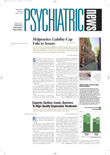APA is holding out hope that its Senate allies will prevail in increasing the Fiscal 2004 budget for the National Institutes of Health (NIH) when the full Senate votes on the next year’s spending bill for the departments of Labor, Health and Human Services, and Education.
It was uncertain as of July 21 whether the Senate vote would occur before or after this month’s congressional recess.
Once the Senate votes on the labor and health and human services appropriations bill, conferees from the House and Senate will meet to reconcile differences between their versions of the appropriations bill.
The Senate Appropriations Committee passed its appropriations bill (S 1356) in June with a 3.7 percent increase for NIH. The House of Representatives passed its spending bill (HR 2660) with a 2.5 percent increase for NIH.
The increase of $1 billion in the Senate bill resulted from a vote approving an amendment to the Fiscal 2004 budget resolution by Sens. Tom Harkin (D-Iowa) and Arlen Specter (R-Pa.) that provided an additional $2.8 million for discretionary health research and services programs, including $1.8 million for NIH.
“While APA fully appreciates that the Senate Appropriations Committee is recommending a 3.7 percent increase in the NIH budget from Fiscal 2003, we are still hopeful that when the legislation goes to the Senate floor, additional funds will be directed to NIH,” said Eugene Cassel, J.D., acting director of government relations at APA.
APA and other members of the Mental Health Liaison Group and Ad Hoc Group for Research Funding lobbied for a 10 percent increase above the current level for NIH and the three mental health and addictions institutes. That would raise the total NIH budget to $30 billion in Fiscal 2004, $2.1 billion more than the amount proposed by President Bush and passed by the House.
The Senate traditionally appropriates more generous increases for NIH than does the House. This pattern is also seen in the following Fiscal 2004 budget increases for the national institutes devoted to mental health, drug abuse, and alcoholism:
• National Institute of Mental Health: The Senate proposed an increase of $58.9 million for a total of $1.4 billion, compared with the House’s proposed increase of $41.1 million for a total of $1.38 billion.
• National Institute on Drug Abuse: The Senate proposed an increase of $35.9 million for a total of $997.6 million, compared with the House’s proposed increase of $33.9 million for a total of $995.6 million.
• National Institute on Alcohol Abuse and Alcoholism: The Senate proposed an increase of $15.4 million for a total of $431.5 million, compared with the House’s proposed increase of $14 million for a total of $430.1 million.
The proposed increases in Fiscal 2004 for NIH and the mental health and addictions institutes, however, are nearly two-thirds lower than the previous increases passed by Congress annually since Fiscal 1998. Congress passed a 15 percent increase for NIH in Fiscal 2003, for example, that led to the doubling of its budget between 1998 and 2003.
Members of APA’s Academic Consortium, Mental Health Liaison Group, and Ad Hoc Group on Research Funding have voiced concerns that smaller increases in Fiscal 2004 will curtail crucial ongoing research projects and impede future advances in understanding the causes of mental illnesses and developing effective treatments for those illnesses.
Meanwhile, the House passed larger funding increases than the president’s budget recommendation for certain programs within the Substance Abuse and Mental Health Services Administration (SAMHSA).
The Center for Mental Health Services’ mental health demonstration grant program for children was increased by $6.7 million over the president’s recommendation, for example, and the Program for Alternatives to Homelessness (PATH) was increased by $9 million over the president’s recommendation, according to Lizbet Boroughs, an associate director in APA’s Division of Government Relations.
An update on the status of Fiscal 2004 appropriations relevant to mental health can be accessed on the Thomas Web site at http://thomas.loc.gov/home/approp/app04.html by going to “Labor/HHS/Education.” The House and Senate bills (HR 2660, S 1356) and their respective appropriations committee reports are posted there. ▪
